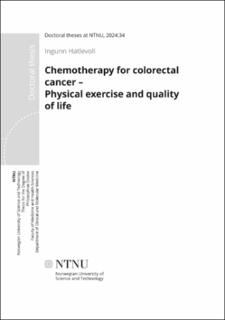| dc.contributor.advisor | Hofsli, Eva | |
| dc.contributor.advisor | Oldervoll, Line M. | |
| dc.contributor.advisor | Skolbekken, John-Arne | |
| dc.contributor.advisor | Wibe, Arne | |
| dc.contributor.author | Hatlevoll, Ingunn | |
| dc.date.accessioned | 2024-02-12T12:54:09Z | |
| dc.date.available | 2024-02-12T12:54:09Z | |
| dc.date.issued | 2024 | |
| dc.identifier.isbn | 978-82-326-7669-9 | |
| dc.identifier.issn | 2703-8084 | |
| dc.identifier.uri | https://hdl.handle.net/11250/3117002 | |
| dc.description.abstract | Colorectal cancer (CRC) is the third most common cancer worldwide, the second most common cancer in Norway, and the second leading cause of cancer deaths both globally and nationally. In Norway, 4745 new cases were diagnosed in 2022, and 1591 persons died from the disease the year before. Sedentary lifestyle is associated with increased risk of developing CRC and with reduced chance of survival after the diagnosis. A steady increase in survival has been observed over the past decades, and an increasing number of people are living with a present or former diagnosis of CRC and with long-term side effects from treatment.
Different chemotherapy combinations play a central part in treatment of CRC, both in the curative and the palliative settings. Chemotherapy has several both short- and long-term side effects, such as fatigue, peripheral neuropathy and reduced physical function, negatively affecting health-related quality of life (HRQoL). Choice of treatment should not only focus on survival and tumour response, but also on patients´ symptoms, functioning and overall wellbeing. When cure is not an option, the main treatment goals are to allow patients to live longer and to live better. During recent years, an increased incidence of CRC among younger people has been observed, although CRC primarily affects the elderly, with a median age at diagnosis of approximately 73 years. There are concerns whether older patients will tolerate chemotherapy as well as the younger patients.
There are increasing evidence that physical exercise (PE) both during and after cancer treatment have beneficial effects on several cancer-related health outcomes, but the majority of studies performed are in early stage breast cancer and in prostate cancer. Potential benefits of a PE intervention during adjuvant chemotherapy for CRC are less studied, and recruiting patients with CRC to PE interventions has been found challenging by several investigators.
This thesis is based on studies from two different patient populations; CRC patients during adjuvant chemotherapy and CRC patients during palliative chemotherapy. The aim is to gain increased insight in the feasibility of a PE intervention during adjuvant chemotherapy for CRC, how patients experience physical exercise during chemotherapy, and how chemotherapy affects HRQoL in the palliative phase.
As a preparation for a future randomized controlled trial (RCT), we have conducted a feasibility study of an individually adjusted and supervised PE program combining aerobic, strength and balance training during adjuvant chemotherapy for CRC. We have demonstrated that this intervention is feasible and safe with both a high willingness to participate and adherence to the program, but with a need to accommodate PE interventions closer to patients´ homes. Further, we have performed a qualitative interview study among participants in the PE intervention, demonstrating that patients experience several benefits, both physically and mentally, participating in the program and the importance of PE being supervised.
Finally, we have conducted an observational study of an unselected cohort of metastatic CRC patients in Middle-Norway, analysing changes in selected HRQoL outcomes the first year of palliative chemotherapy, demonstrating that large deteriorations in fatigue and physical functioning are experienced by a significant proportion of the patients the first months of treatment, that older (>70 years) patients did not experience more deterioration in HRQoL than the younger, and that the positive impact of a chemo-break on HRQoL seems to be larger in a real-life population than in patients included in RCTs. | en_US |
| dc.language.iso | eng | en_US |
| dc.publisher | NTNU | en_US |
| dc.relation.ispartofseries | Doctoral theses at NTNU;2024:34 | |
| dc.relation.haspart | Paper 1: Hatlevoll, Ingunn; Oldervoll, Line Merethe; Wibe, Arne; Stene, Guro Birgitte; Stafne, Signe Nilssen; Hofsli, Eva. Physical exercise during adjuvant chemotherapy for colorectal cancer - a non-randomized feasibility study. Supportive Care in Cancer 2020. This article is licensed under a Creative Commons Attribution 4.0 International License CC BY. Available at: http://dx.doi.org/10.1007/s00520-020-05789-z | |
| dc.relation.haspart | Paper 2: Hatlevoll, Ingunn; Skolbekken, John-Arne; Oldervoll, Line Merethe; Wibe, Arne; Hofsli, Eva. Colorectal cancer patients’ experiences with supervised exercise during adjuvant chemotherapy—A qualitative study. Scandinavian Journal of Medicine & Science in Sports 2021 ;Volum 31.(12) s. 2300-2309. This is an open access article under the terms of the Creative Commons Attribution. CC BY NC-ND. Available at: http://dx.doi.org/10.1111/sms.14048 | |
| dc.relation.haspart | Paper 3: Hatlevoll, Ingunn; Kristensen, Are Korsnes; Solheim, Tora Skeidsvoll; Elvebakken, Hege; Salvesen, Øyvind; Oldervoll, Line Merethe; Wibe, Arne; Hofsli, Eva. Do elderly colorectal cancer patients experience more deterioration in health- related quality of life during the first year of palliative chemotherapy? – A prospective real-world observational study. Submitted paper. Preprint available at: https://doi.org/10.21203/rs.3.rs-2226936/v1 | |
| dc.title | Chemotherapy for colorectal cancer - Physical exercise and quality of life | en_US |
| dc.type | Doctoral thesis | en_US |
| dc.subject.nsi | VDP::Medisinske Fag: 700::Klinisk medisinske fag: 750 | en_US |
| dc.description.localcode | Fulltext not available | en_US |
